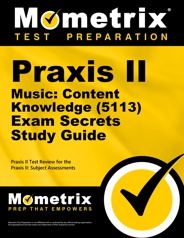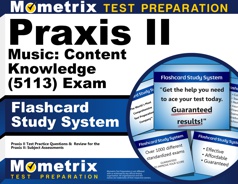The Praxis Music: Content Knowledge exam is geared toward undergrad students in a music education program and assesses the knowledge and understanding of music and music education of the beginning teacher.
Click “Start Test” above to take a free Praxis Music practice test!
Exam Outline
The Praxis Music exam contains 120 selected-response questions and has a 2-hour time limit.
The exam is split into two sections: a listening section and a non-listening section. In the listening section, you will listen to musical excerpts and answer the related questions, while the non-listening section just contains normal questions to answer without any audio components.
The questions on the exam are grouped into four content categories. Below, you will see how many questions are in each category, as well as how many of those questions appear in each section of the exam.
I. Music History and Literature (18 questions)
Section 1: 9 | Section 2: 9
The questions in this category assess your knowledge of the following:
- History of major musical style developments
- Significant characteristics of important musical styles and historical periods
- Various world music styles
- Functions of different styles of music in the culture of origin
- Various print and electronic sources of music history information and literature
II. Theory and Composition (19 questions)
Section 1: 9 | Section 2: 10
The questions in this category assess your knowledge and skills in the following areas:
- Understanding and analyzing music in aural and written form
- Demonstrating aural skills through melody, harmony, and rhythm recognition
- Timbre of instruments and voices
- Musical dynamics
- Basic music theory concepts that apply to composing, arranging, and orchestrating
III. Performance (27 questions)
Section 1: 12 | Section 2: 15
The questions in this category assess your knowledge and skills in the following areas:
- Identifying errors in rhythm, pitch, balance, blend, dynamics, intonation, and articulations
- Basic conducting techniques
- Interpretation of notation and expressive elements for performance
- Basic accompaniment techniques
- Strategies for preparing music for rehearsal and performance
- Instrumental and vocal warm-ups
- Techniques for instrumental and vocal tuning and intonation
- Concert etiquette for audiences and performers
- Techniques for communicating with an audience in a performance setting
- Relationship between performance and acoustics
IV. Pedagogy, Professional Issues, and Technology (56 questions)
Section 1: N/A | Section 2: 56
The questions in this category assess your knowledge and skills in the following areas:
Pedagogy
- Instructional strategies for different class settings
- Incorporation of national, state, and local standards
- Classroom management techniques
- Planning and differentiating instruction
- Incorporating diverse learning modalities
- Accommodating students’ needs by modifying instruction
- Assessment strategies that inform the instruction process
- Selecting appropriate repertoire for the classroom
- Teaching vocal production and performance techniques
- Instrumental techniques
- Common vocal and instrumental performance challenges
- Preparation and organization of concert programming
- Care and maintenance of materials and instruments
- Common pedagogical approaches
- Developing sight-reading skills
- Improvisational techniques
- Basic arranging and composition techniques
- Teaching various musical concepts through performance literature
- Fostering musically expressive experiences
- Integrating concepts used in other disciplines in music instruction
Professional Issues
- Professional ethics and legal issues
- National Core Arts Standards
- Professional organizations and resources in music education
- Current music education trends and issues
- Major historical and philosophical contributions to music education
- Philosophical reasons for the inclusion of and advocacy for music in the curriculum
- Importance of collaboration with colleagues
- Two-way communication with parents/guardians
- Basic administrative responsibilities
- The effect of external influences on the music program, curriculum, and student participation
- Career opportunities available in music
- Physically healthy performance practices
Technology
- Current performance and recording production technologies
- Incorporating technology and instructional software in the classroom
- Desktop music publishing software
- Safe, ethical, and appropriate uses for music software and internet technology
Check Out Mometrix's Praxis Study Guide
Get practice questions, video tutorials, and detailed study lessons
Get Your Study Guide
Registration
To register for the Praxis Music exam, you will need to create an online ETS account. Once this account is created, you can apply to take the exam.
During the exam registration, you will be asked to select the test-taking format (remote or at a testing center), test location (if you are taking the test at a testing center), and test date. You will also need to pay the $130 exam fee.
Test Day
In-person Testing
On the day of your exam, you should arrive at the testing facility about 30 minutes before the scheduled appointment to allow time for the check-in process. During the check-in process, you will be asked to present two forms of valid identification, one of which must be a photo ID.
Personal items will not be allowed into the testing center, so you will be asked to leave things like your phone, wallet, bags, and food items at home or in your car.
After you have been checked-in and your personal items have been stored, you will be led to the testing area and given a brief overview of the testing system before starting your exam.
Remote Testing
To take the exam remotely, you must use a non-touchscreen laptop or desktop computer, and you must have a working speaker, microphone, and camera hooked up. Before test day, you will need to download and install the ETS Secure Test Browser on your computer, which is what you will use to take the test.
Your environment must be private, with no traffic in and out of your testing area. The area where you take the exam must be clear of all personal items, and you will not be allowed to wear headphones. The proctor will ask you to move the camera around so that your testing area can be observed.
How the Exam is Scored
Your Praxis Music exam score is calculated using a scaled scoring system that takes your raw score (the number of questions you answered correctly) and turns it into a scaled score from 100 to 300.
The score you need in order to pass the test is different depending on the state you take it in.
Check Out Mometrix's Praxis Flashcards
Get complex subjects broken down into easily understandable concepts
Get Your Flashcards
FAQs
Q
How many questions are on the Praxis Music exam?
A
There are 120 selected-response questions on the exam.
Q
How long is the Praxis Music exam?
A
The time limit for the exam is 2 hours.
Q
What is the passing score for the Praxis Music exam?
A
The score you need to pass the exam will be different depending on which state you take the exam in.
Q
How much does the Praxis Music exam cost?
A
The examination fee is $130.

